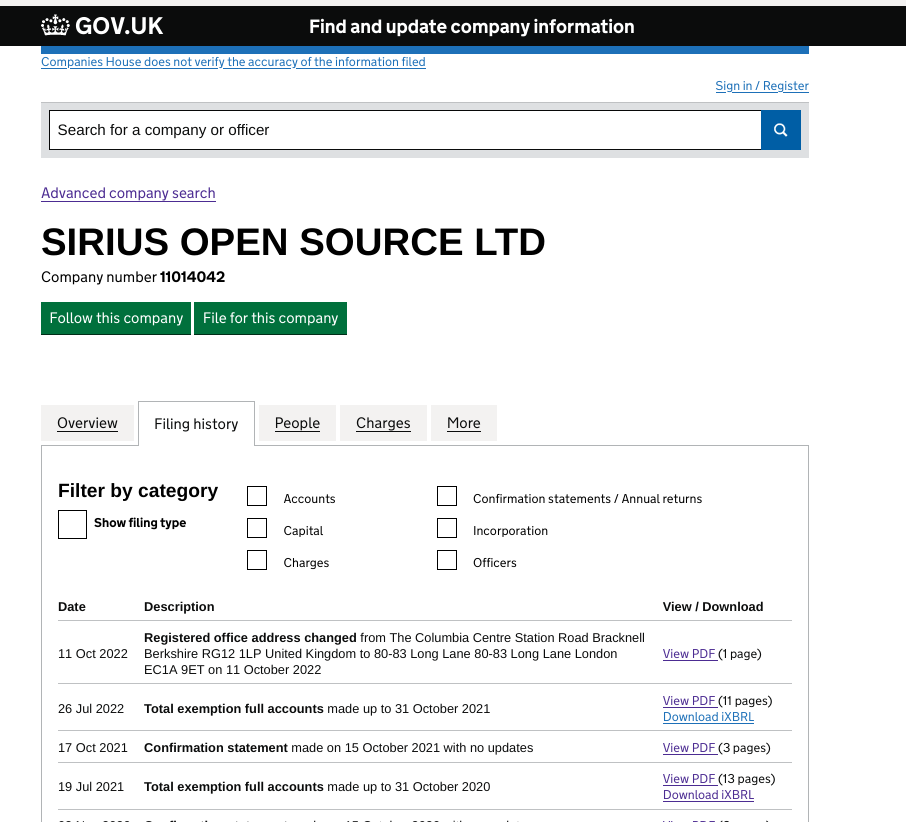Monday, December 5th, 2022, 12:19 am
Chronic Abuse in Sirius Open Source Ltd.
Summary: Part 3 of a report regarding Sirius Open Source, which is imploding after bad judgement and misuse of power against employees
THE signs of Sirius collapsing were all over the place. In Part I and in Part II (see index) we explained some of the earlier days of the company, which turns 25 next year. It might not even reach this milestone at all. Prognosis is negative.
People can understand that institutions are failing when people improperly qualified are assigned jobs they are incapable of doing. This is where Sirius is today. And now we come to Part 3, looking back a bit:
The Open Source Era
Humble Beginnings
Roy’s loyalty to the company is evident and easily provable considering how long he has served the company. But now it is not the company he entered in early February 2011; nor is this the company Rianne entered in 2013. Much patience and tolerance were needed to justify staying in the company for so long (in 2 months it’ll be full 12 years since Roy joined), especially after unforgettable tirades from management that has since then been (apparently) removed, albeit only after a lot of backlash from a lot of staff. 12 years is a long, long time. Roy worked there from his 20s to his 40s. He had much better job offers elsewhere. 12 years is also the longest any existing worker has served the company. That’s very long by today’s standards, where employment records are a lot shorter than back in the 1960s-1980s. A lot of people hop between jobs only months or a few years apart. But not Roy.
Both Roy and Rianne have consistently and persistently demonstrated loyalty to the company, sticking to it even when times were rough and people elsewhere offered “better” jobs. This, as a matter of very simple fact, is why there’s a benevolent fight for the company and its (original) core mission. It’s why internal issues are escalated internally (not to publicly embarrass the company) and misguided directions get highlighted without admonishing anyone.
It’s important not to derail core tenets of the company. It’s essential for recruitment, which can beget better clients, in turn rewarding the staff, too. People who don’t care about their employer simply keep quiet, blindly follow instructions, and don’t care about long-term consequences. Those are typically employees that just come and go. They don’t offer much value to the company (training takes up a lot of time and it’s an investment which goes astray), so they don’t fully develop familiarity, skills, personal connection etc. (among colleagues and among clients, who learn to trust the company based on names of long-serving people). Many of them cannot develop software, either.
A Fast-Rotting Apple
Companies succeed and perish based on what people they can attract and what people they lose. In the case of Sirius, much was lost and almost nothing gained in the “human capital” or “human resources” sense. It’s becoming a crisis. More on that later.
Over the past decade or longer there has been a change of leadership and severe brain drain. Morale has not been good, to put it politely. The Sirius management figures rely far too much on credibility of a company that existed well over a decade ago — a company that had a physical office (real location), a clearer and more elaborate leadership structure, and a lot of office staff, not just remote workers. The company had assets, certified professionals in fields of operations (not just technical fields), and therefore it functioned a lot more reliably, e.g. in the accountancy. There were cheques and balances. There were actual domain-proficient departments and not self-appointed jacks of all trades.
As we shall see later, there was also a change of address in October: [sic]
This is not the Sirius address, it is the accountancy’s address.
Sadly, what we’re seeing or what ‘low-level’ employees have witnessed so far this year is a growing level and ever-increasing frequency of cover-up (few examples to come later) of what was/is really happening. Those who are portrayed as troublemakers are in fact those who supposedly ‘threaten’ this veil of secrecy or amicably challenge the company to improve (from within, repeatedly if necessary, in order to spare otherwise-avoidable damage and save face). As internal avenues of grievances are exhausted, people start speaking to friends, even without naming any persons, companies etc. This is a well-known high cost of failing to act upon internal suggestions or constructive complaints, leaving little leeway and inevitably causing a sort of spill-over of woes and gripes. This, suffice to say, is another example of managerial failure. Being unable to listen (not just hear but actually listen) to workers is a weakness. It’s not a strength, although it can be rather tempting to simply ignore critics and impulsively alluring to reject criticism as fundamentally “invalid”, “void”, “hostile”, “paranoid”, “ignorant” and so on. Egocentric companies end up with no inflation in business, just inflation of the self. That weakens teamwork. A cohesive working environment boils down to collaboration and deep trust, not a bunch of superhero avatars in Slack channels, which to an outsider may indicate that the company is immature, unprofessional, and child-like.
In the past, the company known as “Sirius” (same name, very different people) had more competent administrators (like a person associated with the Ubuntu community back when Roy joined), i.e. folks who actually understood the products and services that Sirius provided. It helps to have such people onboard because of networking and links; they can bring business (around that time Sirius had clients directly connected to Ubuntu; it was a gateway to a flourishing network of other clients). Likewise, some world-class and well-known PostgreSQL engineers were employed by the company; this is a sign of solid corporate leadership, technical leadership, and also a lead to future clientele. Of course almost all of those people have since then left the company, leaving the company with a “skeleton crew”.
Having an administrator with no background in computing is not a good idea; clients can sense they’re interacting (e.g. over the telephone) with people whose skills are limited to “personal assistant” that soon got promoted to management due to an unfilled vacuum. Potential of career leap may seem nice, but that comes at a collective, company-wide cost. Another aspect of this phenomenon was in recent years dubbed “imposter syndrome”. That can lead to insecurity, which in turn causes backlash, outbursts, and paranoia. It makes any workplace potentially toxic. Any time a company is hiring unskilled people or promoting people in spite of a lack of relevant skills it causes issues on several levels; clients lose respect, workers feel dissatisfied, and job roles cannot be performed (maybe not by intention, but high forms of incompetence are not distinguishable from malice). Due to (corporate) survival instincts, those being scrutinised can turn aggressive very fast.
In the past 4 years staff casually witnessed tantrums (albeit staff was subjected to divide-and-rule tactics, impeding communication between staff or across teams); that typically came from above, not from below, e.g. managers resorting to bullying. General consensus within workers’ circles is that at least some of that stems from some people’s desperate desire to cover up their lack of capabilities. This is very dangerous to any company, including those who do the bullying (after all, without the company they too would be unemployed). Those who stand to lose the most are long-serving staff, whose CV is closely connected and long-connected to that one firm. Those who just come and seed destruction can move on and repeat the same modus operandi. Short-term workers have a different set of personal interests. That’s just how it is.






 Filed under:
Filed under: 




